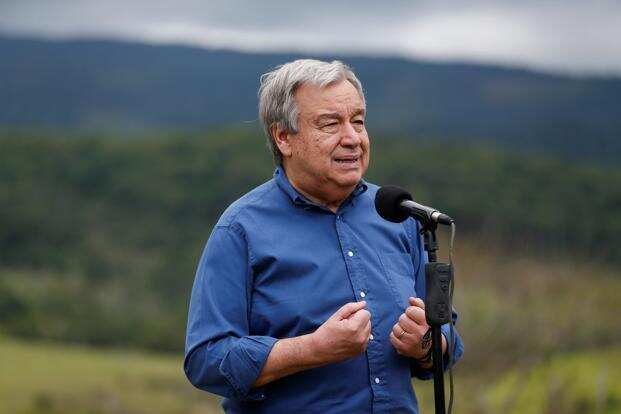
- ARAB NEWS
- 11 Jul 2025

It is unusual to see the secretary-general of the UN lash out at global leaders. Thus, it was a surprise, albeit a pleasant one, to see Antonio Guterres take to Twitter and accuse governments and businesses of lying on climate change.
In a series of tweets this month, Guterres said that, while the leaders of several governments and businesses had committed to cutting their carbon emissions, they had failed to do so. “The latest IPCC report is a litany of broken climate promises. Some governments and business leaders are saying one thing but doing another. They are lying. It is time to stop burning our planet,” Guterres tweeted the day the Intergovernmental Panel on Climate Change published its latest report.
Unusual it may have been, but Guterres’ outburst underlined the biggest challenge with the way climate change is being tackled at the international level. It highlighted a basic flaw with the Paris Agreement of 2015 and all subsequent agreements dealing with climate change, in which various nations signed up to reduce their carbon footprint and cut, vigorously, all greenhouse gas emissions in order to keep the rise in global temperatures to as close as possible to 1.5 degrees Celsius above the pre-industrial era. The biggest weakness, which has been cited time and again by various activists, is that none of the commitments are binding.
The Paris Agreement does not have a framework for monitoring progress or sanctioning countries that fail to meet the targets they have committed to. It was utopian on the part of the UN Framework Convention on Climate Change to expect that all countries would maintain self-discipline and meet their targets without any control or supervision.
Few international agreements are as benign as the Paris Agreement, as most have very robust monitoring mechanisms that involve imposing tough sanctions on violators. Take the Montreal Protocol on Ozone Depleting Substances, signed in 1987, which is loaded with a strong monitoring mechanism and clearly outlines penalties for those failing to meet their commitments. That is the reason the Montreal Protocol stands out as the sole environment-related multilateral agreement that has worked. Another example of an international pact that has managed to keep countries in check is the World Trade Organization, which has imposed sanctions and fines on nations that break the rules.
Thus, it was fanciful of the UNFCCC to imagine that, without any supervision, all countries would keep to their commitments and cut their emissions as per the schedule. Indeed, one of the earliest red flags for the UN should have been the fact that talks on climate change had been going on for more than three decades without any agreement being reached. Moreover, it was clearly premature for the UN to celebrate the Paris Agreement, as it lacked the checks and balances needed. Moreover, in the seven years since Paris, there have been numerous warnings for the UN and anyone else bothered to keep their eyes on the ball.
Indeed, in every single one of its quarterly reports, the IPCC — the international body of scientists mandated by the UN to track climate change — has been flagging the issue of a world headed to a catastrophic scenario, as carbon dioxide emissions have risen incessantly since the Paris Agreement, instead of falling or at least levelling off, which would have happened if the commitments by even a handful of major emitters had been respected. Instead, each report has come with a sterner warning about the world missing the bus on this key issue.
So, it is indeed surprising that Guterres has chosen to believe his own team of scientists at this belated stage. Yet, better late than never. Fortunately, for Guterres and indeed for the world, despite warning that we are headed for a catastrophic scenario if we fail to act rapidly, the IPCC report does highlight that it is neither very expensive, nor very challenging, technologically speaking, for humankind to cut emissions.
It was fanciful to imagine that, without any supervision, all countries would keep to their commitments and cut their emissions as per the schedule.
Ranvir S. Nayar
It says that the cost of solar power and wind energy, as well as batteries, has fallen by 85 percent since 2010, while a number of laws have boosted energy efficiency. It goes on to say that it is possible to cut emissions by at least half by 2030 in all sectors and, with the right policies and technology, by as much as 70 percent by the year 2050.
The report says there are plenty of low-cost climate mitigation options and that it is possible to implement options that cost less than $100 per ton of carbon dioxide emissions in order to cut the planet’s total greenhouse gas emissions in half by 2030. It goes on to say that this option is far cheaper and more sustainable than the cost of continuing on the path of destruction.
The IPCC’s warning is clear: If the world does not manage to cut its emissions by 43 percent from the current levels by 2030 and if global emissions do not peak by 2025, then the 1.5 C rise in temperature will be breached. Such a reduction is downright impossible, considering that emissions across the world have been rising consistently, especially since the end of the pandemic, meaning this appears to be little more than wishful thinking on the part of the panel. Even if emissions did miraculously peak within the next three years, the world is clearly headed to a 2 C rise, unless emissions fall by more than a quarter by 2030 — another impossible feat going by the planet’s current track record.
The IPCC’s next report is due in less than three months. One can expect more harsh words from Guterres, but until the issue of penalties and sanctions on the countries that miss their targets is sorted out, that will be all he or anyone else can do.